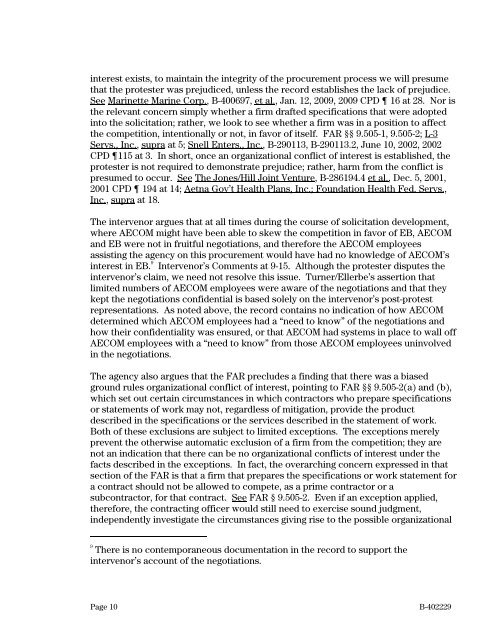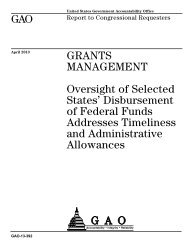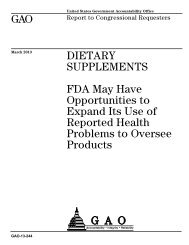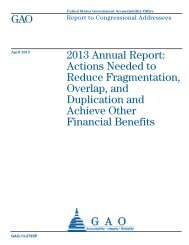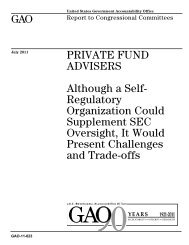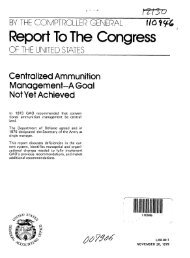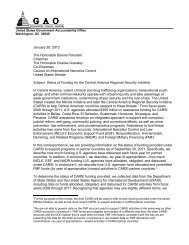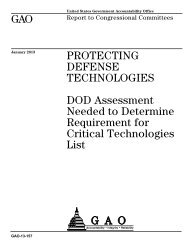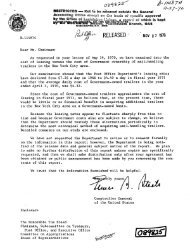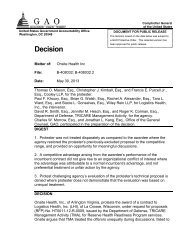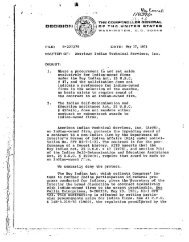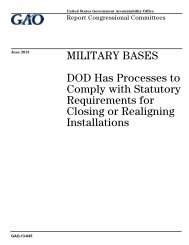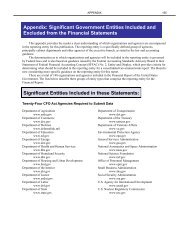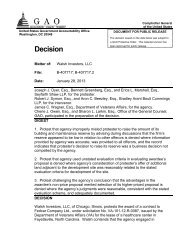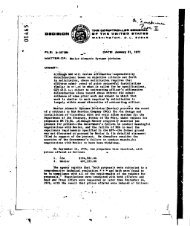B-402229 B.L. Harbert-Brasfield & Gorrie, JV - US Government ...
B-402229 B.L. Harbert-Brasfield & Gorrie, JV - US Government ...
B-402229 B.L. Harbert-Brasfield & Gorrie, JV - US Government ...
You also want an ePaper? Increase the reach of your titles
YUMPU automatically turns print PDFs into web optimized ePapers that Google loves.
interest exists, to maintain the integrity of the procurement process we will presume<br />
that the protester was prejudiced, unless the record establishes the lack of prejudice.<br />
See Marinette Marine Corp., B-400697, et al., Jan. 12, 2009, 2009 CPD 16 at 28. Nor is<br />
the relevant concern simply whether a firm drafted specifications that were adopted<br />
into the solicitation; rather, we look to see whether a firm was in a position to affect<br />
the competition, intentionally or not, in favor of itself. FAR §§ 9.505-1, 9.505-2; L-3<br />
Servs., Inc., supra at 5; Snell Enters., Inc., B-290113, B-290113.2, June 10, 2002, 2002<br />
CPD 115 at 3. In short, once an organizational conflict of interest is established, the<br />
protester is not required to demonstrate prejudice; rather, harm from the conflict is<br />
presumed to occur. See The Jones/Hill Joint Venture, B-286194.4 et al., Dec. 5, 2001,<br />
2001 CPD 194 at 14; Aetna Gov’t Health Plans, Inc.; Foundation Health Fed. Servs.,<br />
Inc., supra at 18.<br />
The intervenor argues that at all times during the course of solicitation development,<br />
where AECOM might have been able to skew the competition in favor of EB, AECOM<br />
and EB were not in fruitful negotiations, and therefore the AECOM employees<br />
assisting the agency on this procurement would have had no knowledge of AECOM’s<br />
interest in EB. 9<br />
Intervenor’s Comments at 9-15. Although the protester disputes the<br />
intervenor’s claim, we need not resolve this issue. Turner/Ellerbe’s assertion that<br />
limited numbers of AECOM employees were aware of the negotiations and that they<br />
kept the negotiations confidential is based solely on the intervenor’s post-protest<br />
representations. As noted above, the record contains no indication of how AECOM<br />
determined which AECOM employees had a “need to know” of the negotiations and<br />
how their confidentiality was ensured, or that AECOM had systems in place to wall off<br />
AECOM employees with a “need to know” from those AECOM employees uninvolved<br />
in the negotiations.<br />
The agency also argues that the FAR precludes a finding that there was a biased<br />
ground rules organizational conflict of interest, pointing to FAR §§ 9.505-2(a) and (b),<br />
which set out certain circumstances in which contractors who prepare specifications<br />
or statements of work may not, regardless of mitigation, provide the product<br />
described in the specifications or the services described in the statement of work.<br />
Both of these exclusions are subject to limited exceptions. The exceptions merely<br />
prevent the otherwise automatic exclusion of a firm from the competition; they are<br />
not an indication that there can be no organizational conflicts of interest under the<br />
facts described in the exceptions. In fact, the overarching concern expressed in that<br />
section of the FAR is that a firm that prepares the specifications or work statement for<br />
a contract should not be allowed to compete, as a prime contractor or a<br />
subcontractor, for that contract. See FAR § 9.505-2. Even if an exception applied,<br />
therefore, the contracting officer would still need to exercise sound judgment,<br />
independently investigate the circumstances giving rise to the possible organizational<br />
9<br />
There is no contemporaneous documentation in the record to support the<br />
intervenor’s account of the negotiations.<br />
Page 10 B-<strong>402229</strong>


